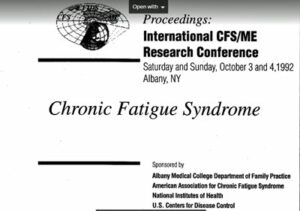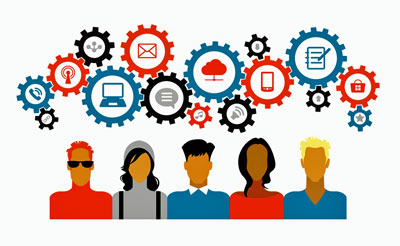It’s coming – the granddaddy of them all – the IACFS/ME’s International ME/CFS Conference. The ME/CFS field may have struggled for decades to get funding, it may still be derided by some (witness the reason for a recent NIH grant application rejection: “it’s depression”), it may still be being ignored by the NIH, etc., but there’s one thing this field did right almost from the very beginning – something that a lot of struggling fields don’t do: it has always put on international conferences.
30th Anniversary Conference!

The first IACFS/ME conference took place 30 years ago in Albany, New York.
This conference this year is the 30th anniversary of the first conference which took place in Albany, New York on Oct 3rd/4th, 1992. You can still pick up the conference proceedings on the IACFS/ME website.
That first conference was notable for how many of the early movers and shakers, who did so much early on to keep interest in ME/CFS alive, participated. It was like a Who’s Who of the early ME/CFS movement in the U.S, in particular. It included Dr. David Bell, Dr. Charles Lapp, Dr. Paul Cheney, Dr. Tony Komaroff, Dr. Jay Goldstein, Dr. Nancy Klimas, Dr. Daniel Peterson, Dr. Byron Hyde, Leonard Jason, Mary Ann Fletcher, Fred Friedberg, Andrew Lloyd, Hirohiko Kuratsune all participated.
Some prominent figures at the conference (Dr. Paul Levine, Dr. Dedra Buchwald, Marc Iverson) dropped out over time, but most would end up spending their careers immersed in this illness. It took real courage, back then in particular, to stand in the face of massive disagreement and assert this was a real and serious disease. We owe them so much for their commitment to us and this field.
Some of the talks were of the time: there were talks on clusters, Ampligen, RNase L, kutrapressin, retroviruses, and retroviral treatments. Some, however, still seem quite timely. Simpson, for instance, gave a talk on red blood cell shape changes (!). Andrew Lloyd was using exercise to explore the immune system, another talk focused on T-cells, there was one on enteroviruses, and one interesting one touched on “the important etiologic relationship between chronic fatigue syndrome and Sjogren’s Syndrome” – something that has barely been touched upon since then but could be important.
Over time the conference has traveled around quite a bit: it’s been to Albany, Miami, San Francisco, Boston, Seattle, Chicago, Bloomington, Madison, Fort Lauderdale, Oslo, Okinawa, Reno, and Ottawa.
Three decades and 16 conferences later here we are with the first conference slated to take place in New York City. Thanks to the resurgence of the pandemic, the IACFS/ME 2022 Virtual Medical and Scientific Conference from July 27 – 30, 2022, however, is going to be virtual. Hopefully, though, next year, or the next year, we’ll get an IACFS/ME conference in the big apple. It’s way past time.
The 2022 Conference – July 27th-30th
Workshops
First comes a day of workshops. Workshops on caring for long-COVID patients – from ME/CFS practitioners – should give us an ME/CFS expert’s view, of how, if in any way, they differ from people with ME/CFS. We also get Lauren Stiles – the creator of Dysautonomia International – at an IACFS/ME Conference. Stiles – whose story is well worth reading, if you haven’t yet – has worked wonders in bringing the field of dysautonomia out of the shadows and into the bright lights. She will also be talking about dysautonomia, POTS, and ME/CFS in the Research section.
She’s long thought that the ME/CFS, FM, POTS, and dysautonomia fields are too siloed and speak too little to each other, and has thought about how much faster we could move if we could bring the strengths of these fields together. Now, here she is – in her first but not the last presentation – at the 2022 IACFS/ME conference.
At the end of the day, comes long two-part sessions on where we are in advocacy, or on how occupational and physical therapy can help out.
The Research Presentations
Striking a Key Note
The IACFS/ME scored when they got Yale immunologist Akiko Iwasaki to give the keynote talk. Iwasaki is right in the middle of things: she’s co-leading the Yale COVID-19 Recovery Study, as well as multiple other studies investigating the pathology of long COVID, and is developing animal models of long COVID. Just this year she received the 2022 Lupus Insight Prize (LIP) for her discovery of a link between endogenous retroviruses and systemic lupus erythematosus (SLE). She was just featured in a Wired piece on brain fog and long COVID.
She’s given updates on long-COVID research to the American Medical Association, and is regularly sought out for her views on long COVID. In short, it’s very good to have this long-COVID expert “in-house” and interacting with us.
We also get an hour-long plenary lecture from one of the modern movers and shakers of the ME/CFS world: Dr. David Systrom – the Harvard pulmonologist whose invasive exercise studies over the past 5 years or so have revolutionized our understanding of what’s happening during exercise in ME/CFS. With his treatment trials (Mestinon, $8 million mitochondrial treatment trial) as well as his connective tissue studies, Systrom is definitely someone to keep a close eye on. Good for the IACFS/ME for finding a keynote speaker who is at the center of so much.
Next comes “Provocative Maneuvers: Methods to Induce Symptomatic Features of ME/CFS” (i.e. how to induce flares in people with ME/CFS during a study). While it’s too bad that people with ME/CFS have to hurt for science, having a session with 7 different participants talking about different ways to do that says to all and sundry – this truly is an exertion-based disease. We’ll also finally get some hard data on the effects that the dreaded but oh-so-revealing two-day exercise tests have on symptoms and activity levels of people with ME/CFS.

Several talks will focus around how gender affects ME/CFS.
The immune section features three researchers new to the field. Avik Roy is a neuroscientist who is now working full-time at Simmaron’s exciting new ME/CFS research effort. He and Gunnar Gottschalk are building a mouse model, which is already producing possible insights into the energy production problems in ME/CFS. Later, Gottschalk will provide a potentially important insight into the neuroinflammation some studies suggest may be present in ME/CFS.
With two talks on exhausted T-cells, it’s looking like exhausted T-cells may be a real thing. This would be a big deal as T-cells play an enormous role in the immune response.
With the big gender split seen ME/CFS, long COVID, fibromyalgia, and autoimmune diseases, we clearly need much more data on how ME/CFS affects men and women. We recently saw how an early part of the pain response acts differently in men and women. Now a study asks whether male and female ME/CFS patients exhibit different immune characteristics. My money guess is that the answer is “yes”.
Gender pops up in the one area where it’s very clear that ME/CFS has played a leadership role – not just in the ME/CFS field but across the medical spectrum. From the 2-day exercise tests that were revived by Workwell to David Systrom’s invasive exercise studies, ME/CFS researchers have excelled in exploring every ramification of exercise they can.
Now comes a big proteomic exercise study, from Arnaud Germain, Ph.D. He’s going to show that exercise produces different protein signatures in males and females with ME/CFS. Since proteins are the worker bees of our cells – they do most of the actual work that gets done – that suggests PEM may be being produced differently in some ways in men and women.

The conference will feature presentations on a diverse array of topics.
With regard to metabolism, it appears that Lenny Jason’s metabolomic study may have uncovered something of a smoking gun. His most recent study apparently found metabolomic differences that were present before the college students he was tracking came down with infectious mononucleosis and developed ME/CFS. Could he have found some sort of hidden metabolic weakness that allowed an infection to kick off ME/CFS?
A metabolomic study that focused on the “anomalous recovery” experienced by people with ME/CFS following exercise may help explain what goes wrong after exercise to produce such prolonged states of PEM. Given that PEM can last for so long, we need more studies that examine the after-exercise period more closely and this appears to be one. A gut dysbiosis study from Japan shows that gut flora issues have immune effects. A most intriguing presentation from Lucinda Bateman, for me, at least, asks if “discordant identical twins can become concordant for ME/CFS?”
Stellate ganglion block (SGB) is an old but fascinating means of resetting the sympathetic nervous system that hasn’t been used much in ME/CFS. Two presentations, however, will apparently indicate that it can help in both ME/CFS and long COVID – and possibly lead to new treatment options.
It was good to see a Ph.D. student continue the long-running saga of EBV research in ME/CFS that’s been going on at Ohio State University for well over a decade. The Ohio State group has been tracking the effects of the strange, smoldering EBV and HHV-6 infections they’ve found in ME/CFS – and it appears they’re getting closer to figuring out just what those infections are doing. Brandon Cox will report that these infections appear to be affecting the antibody response which, with its links to autoimmunity, is on many researchers’ minds.
David Kaufman – who got the ball rolling on oxaloacetate in ME/CFS after he and his patients found it surprisingly effective – apparently has some news on oxaloacetate and ME/CFS. With two oxaloacetate clinical trials underway, it’s clear that oxaloacetate has generated an unusual amount of excitement in this field.
One of the last presentations will ask a very interesting question: how have people with ME/CFS who came down with COVID-19 fare? A Health Rising poll suggested that many people were having a hard time recovering from the virus. It’ll be good to get some hard data on that.
Other presentations are occurring – these are the ones that struck me the most.
Registering

Thirty years later, the all-volunteer organization is still producing international ME/CFS conferences
Registering does three things: it gives you access to the latest ME/CFS and long-COVID findings, gives you access to workshops, and keeps the IACFS/ME and its thirty-year string of International Conferences alive. It’s a minor miracle that this small non-profit, all volunteer-run organization has managed, through thick and thin, to regularly put on all these large conferences. Nothing like it occurs in fibromyalgia or POTS. Please support this organization!
Let’s thank the all-volunteer Board of Directors: Fred Friedberg, Staci Stevens, Lily Chu, Charles Lapp, Sonya Marshall-Gradisnik, Luis Nacul, Theresa Dowell, and Irina Rozenfeld for all their work – as well as the conference sponsors for helping to make this conference happen. They are Cactus Life Sciences, Open Medicine Foundation, Solve M.E., and the Institute for Neuroimmune Medicine.
Now is the time to register – while the early bird rates apply. Register by July 4th, 11:59 PM EDT, and get a 25% discount.
Register for the IACFS/ME Virtual International Conference (July 27-30)







So much water has flowed down the Truckee river since the Mystery Malady that started Chronic Fatigue Syndrome.
Without one single “CFS researcher” ever looking into what the “CFS” syndrome was coined to solve.
Not even one.
ME/CFS Alert Episode 105.
https://www.youtube.com/watch?v=J54iQfzqFOE&t=4s
Cort I’m assuming you will be attending the conference and will let us know of the summaries of the workshops and all speeches. I know I personally do not have the money or the mental capacity to listen to 4 days of technical data but I know that you have done that many times. I don’t know how you do it, but I am grateful that you do. I hope that my assumption is correct because I do like hearing the latest research that is out there regarding CFS and its related conditions.
Cort, as usual, you deliver. Thank you
Any idea if the Patient/Caregiver access lets us participate in the virtual conference space, Gather Town?
Got Fibro & Sensitive to Everything? Part 5: Doing Your Own Mold Research
BY: JACOB TEITELBAUM, MD
https://www.vitality101.com/health-a-z/fibro-sensitivities-p5-mold-toxin-research?fbclid=IwAR0MsO1Xx_G300IzeHb-nrYJast0Z–qW0x1vHQtsfvR6TtZhKDcSfctjpI
When People with Illnesses Have to Do Their Own Research
I invited Erik Johnson, a strong advocate for the connection between toxic mold and CFS, to share his powerful experience with us. The following is from Eric:
During a famous Lake Tahoe outbreak of a mystery illness, I observed that all of the people who fell ill were clustered among “sick buildings.” This has been called “sick building syndrome (SBS),” the cause of which was not yet known. The culprit, toxic mold, had not yet been discovered and entered into medical literature.
This cluster association between prior mold exposure and the chronic form of illness was so consistent that it seemed prudent to ask whether individuals with the mystery malady had problems with mold prior to the Tahoe Flu virus that passed through in the Fall of 1985 through mid 1985. All had a mold story to tell.
To my way of thinking, this elevated the role of mold to a critical cofactor in development of the Lake Tahoe Mystery Illness, as was later noted by the 1994 Chester/Levine abstract based on this very same outbreak.
I devised an experimental strategy of extreme avoidance of toxic mold, which resulted in recovery so spectacular that CFS doctors considered it unbelievable.
For the purpose of achieving validation, I took volunteers diagnosed with Chronic Fatigue Syndrome on a “CFS Mold History Tour” of the Sick Buildings where the clusters occurred.
The reaction of CFS patients to these locations was consistent and compelling enough to warrant incorporating the Toxic Mold, Stachybotrys Chartarum into the official CFS definitional criteria as an extreme risk factor for Chronic Fatigue Syndrome. Considering this is the very first documented clue in the clusters for which this syndrome was coined, it should be included in all studies in which Chronic Fatigue Syndrome terminology is used.
— Erik Johnson
The following excerpt from the book Mold Warriors by Dr. Ritchie Shoemaker (Gateway Press 2005;Chapter 23) recognizes Erik’s foresight:
Mold at Ground Zero for CFS
The history of Chronic Fatigue Syndrome (CFS) begins in Incline Village, Nevada in 1985. In the medical history of CFS, each of the concepts applies—failed theories and failed criticism.
One victim, Erik Johnson, told everyone who would listen that mold was a cause of CFS. He came up with his theory at the wrong time in the politics of medical opinion, as an unknown viral cause was blamed instead. Johnson tried repeatedly to get the attention of leading CFS researchers then and now to look at what he knew about mold sensitivity.
Twenty years passed before Erik’s mold opinions were vindicated.
— Dr. Ritchie Shoemaker
Dr Nancy Klimas acknowledges that mycotoxins are “Shockingly prevalent” in her ME/CFS patient group.
One would think the IACFS/ME should start to take the mold factor seriously now.
https://www.youtube.com/watch?v=YenYSDk_InY
Dr. Nancy Klimas is a world expert clinician and researcher on Chronic Fatigue Syndrome for 30 years. Now, she has been called upon to use her expertise to help COVID-19 patients presenting with the identical symptoms of classic CFS.
https://open.spotify.com/episode/0N4VISpBMktlqRBtZjrDaC
Some of you may have heard of “Chronic Fatigue Syndrome”
Not likely though, because no one acts like it.
Perhaps the name, but nothing of the history of this syndrome.
The Holmes CFS definition was coined in 1988 after a strange outbreak in Incline Village Nevada.
A marathon runner who had been in China came back with a flu that wouldn’t quit.
Within a week, the whole town got sick with what Dr Daniel Peterson called “A Chinese flu”
This flu raged from November 1984 until October 1985, then suddenly stopped.
The reasons for this have never been explained or even discussed, as all researchers simply ignore it.
But I can tell you that Dr Peterson believed a “Typhoid Mary” either died or left town. Dr Cheney wasn’t sure, but told me this.
“These types of viruses acquire mutations which can be lost after passing through an immune competent host, which defeats the mutation that made it human transmissible”
Dr Cheney believed that the way this flu moved through the population and suddenly disappeared was consistent with this profile.
Since no one even remembers that CFS started with a “Chinese flu”, this is very compelling that people know absolutely nothing about CFS history, or surely this would have been brought up at some point.
As told in Dr Ritchie Shoemaker’s book “Mold Warriors”
he told the 20004 IACFS/ME about Mold at Ground Zero for CFS at the 2004 symposium in Madison Wisconsin.
There was no response.
No researcher who ever heard about this looked into it or even showed any signs of cognitive awareness that they had been informed.
This appears to be deliberate, as a means to suppress the toxic mold evidence.
Just as the lack of response here can only be a deliberate tactic to ignore this until it disappears.
Since many mold groups know what the ME/CFS community are doing, we will have to see if you people can get away with it.